Overview
Coding can often be a daunting challenge for developers, with numerous obstacles that can hinder productivity and quality. However, tools like Kodezi are designed to tackle these issues head-on. By automating documentation, Kodezi not only streamlines coding practices but also enhances collaboration among team members. Furthermore, its advanced testing and optimization features empower developers to manage their source code more effectively.
Imagine a scenario where your documentation is automatically generated, freeing up valuable time for actual coding. Kodezi makes this possible, allowing developers to focus on what truly matters—creating high-quality software. In addition, the platform fosters better teamwork, as its collaborative features enable seamless communication and project management.
The benefits of utilizing Kodezi are clear. Developers can expect improved productivity and enhanced code quality, as the tool integrates essential functionalities that support their workflow. By leveraging Kodezi, you can elevate your coding experience and maintain high software standards.
Are you ready to transform your coding practices? Explore the tools available on Kodezi's platform and discover how they can help you overcome common coding challenges while boosting your efficiency.
Introduction
In the rapidly evolving landscape of software development, developers face significant challenges in understanding source code. How can they create efficient and robust applications without mastering this essential skill? Enter Kodezi, an AI-driven tool designed to address these coding challenges. With features that streamline code management and enhance collaboration, Kodezi empowers developers to tackle their projects with confidence.
Furthermore, the benefits of using Kodezi extend beyond mere convenience. By leveraging its capabilities, developers can significantly improve their productivity and code quality, leading to more successful outcomes in their projects. Imagine reducing debugging time and enhancing team collaboration—these are just a few of the advantages that Kodezi offers.
In addition, as the industry embraces new methodologies such as low-code and no-code platforms, it becomes imperative for developers to adapt to these changes while mastering the fundamentals of source code. This comprehensive examination not only highlights the importance of source code but also equips developers with the knowledge to navigate the complexities of modern software development effectively. Explore the tools available on Kodezi and elevate your coding practices today.
Kodezi | Professional OpenAPI Specification Generator - AI Dev-Tool: Streamline Your Source Code Management
Developers often face numerous challenges when managing a source code application, particularly in maintaining clear and accurate documentation. Kodezi addresses these challenges with its Professional OpenAPI Specification Generator, a transformative tool that automates the generation of API specifications. This source code application, driven by AI, allows programmers to concentrate on coding rather than getting bogged down by the complexities of documentation.
By incorporating Kodezi into their workflows, developers can ensure that their APIs are not only well-documented but also compliant with industry standards. This automation significantly reduces the time spent on manual documentation tasks, thereby enhancing overall productivity. Furthermore, it fosters better collaboration among team members, as everyone can easily access the most current API specifications.
As the demand for efficient API management continues to rise, the source code application tools like Kodezi become crucial in navigating the intricacies of modern software development. Why not explore how Kodezi can streamline your coding practices and improve the quality of your code? With Kodezi, you can transform your approach to API documentation and focus on what truly matters—writing exceptional code.
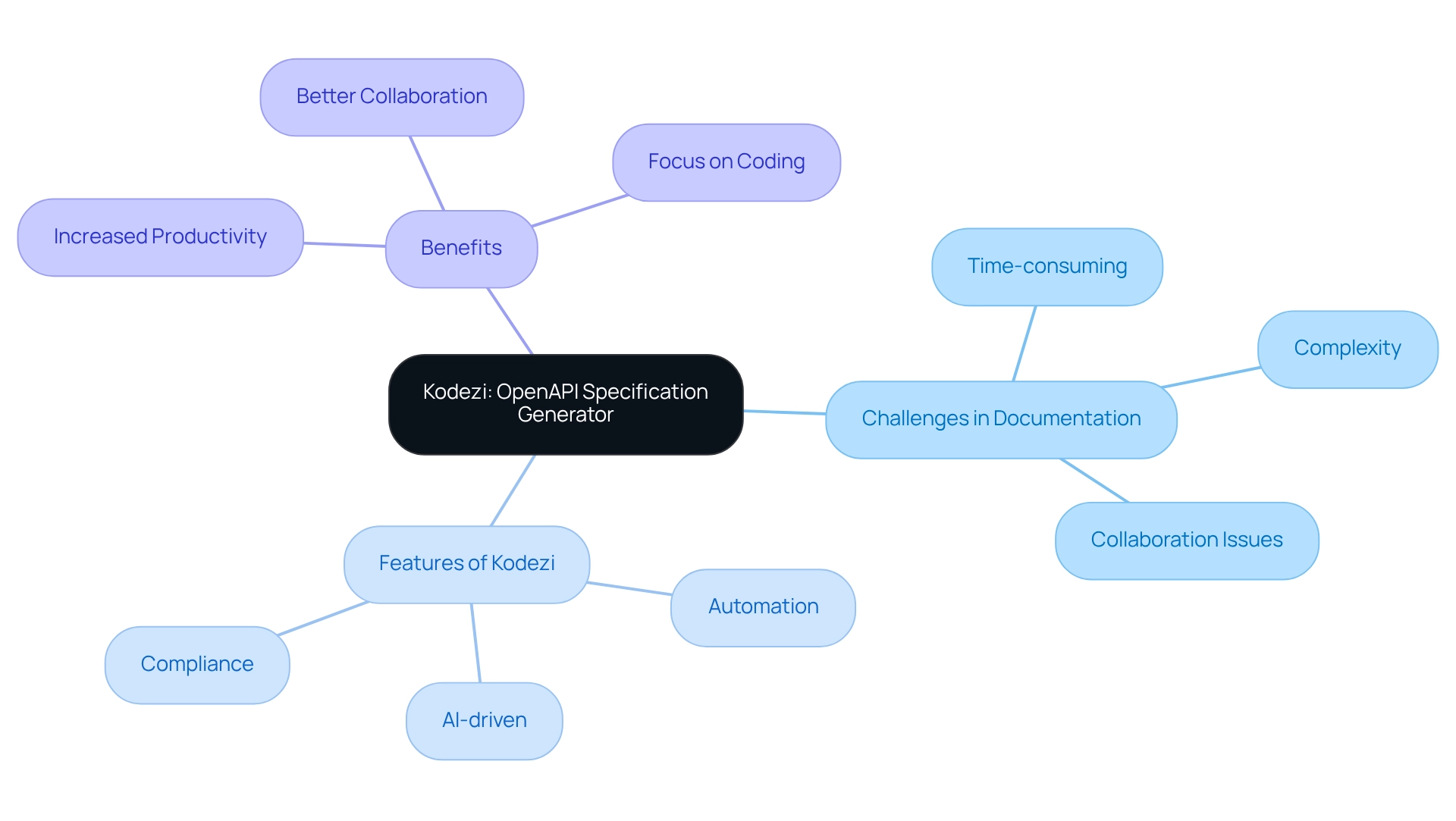
Source Code: Definition and Core Concepts Every Developer Must Grasp
Coding challenges are a common hurdle that developers face in the ever-evolving tech landscape. The source code application refers to the human-readable instructions written in a programming language that define the behavior of a computer program. It serves as the foundation for software development, encompassing various elements such as syntax, semantics, structure, and source code application. Key concepts include:
- Variables
- Functions
- Control structures
- Data types
Comprehending these components is essential for programmers, as they constitute the foundation for crafting efficient and effective source code applications.
In 2023, almost 50% of software creators globally employed Java and Python, emphasizing the importance of grasping these languages and their related principles. As the industry progresses, trends like AI-driven solutions, blockchain technology, Big Data, Cloud Computing, AR/VR, and Cyber Security highlight the necessity for programmers to understand source fundamentals to remain competitive and innovative in their projects. Tools like Kodezi, an AI-driven programming assistant, can greatly improve productivity by automatically rectifying scripts, analyzing bugs, and optimizing programming across various languages and IDEs.
What if there was a way to enhance your coding efficiency? As Ravikumar Patel, a verified expert in engineering, states, "Having a deep understanding of programming languages allows developers to deliver efficient and scalable solutions that exceed client expectations." This insight underscores the vital role that programming language comprehension plays in achieving success in software development. Additionally, a recent case study disclosed that 69.20% of surveyed firms acknowledged the need for AI-driven solutions, demonstrating the significance of adapting to new trends through a strong understanding of programming. By utilizing tools such as Kodezi, programmers can not only enhance their programming abilities but also optimize their workflow, making it simpler to handle and comprehend written instructions efficiently.
In conclusion, exploring the tools available on the Kodezi platform can lead to improved productivity and code quality. Are you ready to elevate your coding practices and embrace the future of programming?
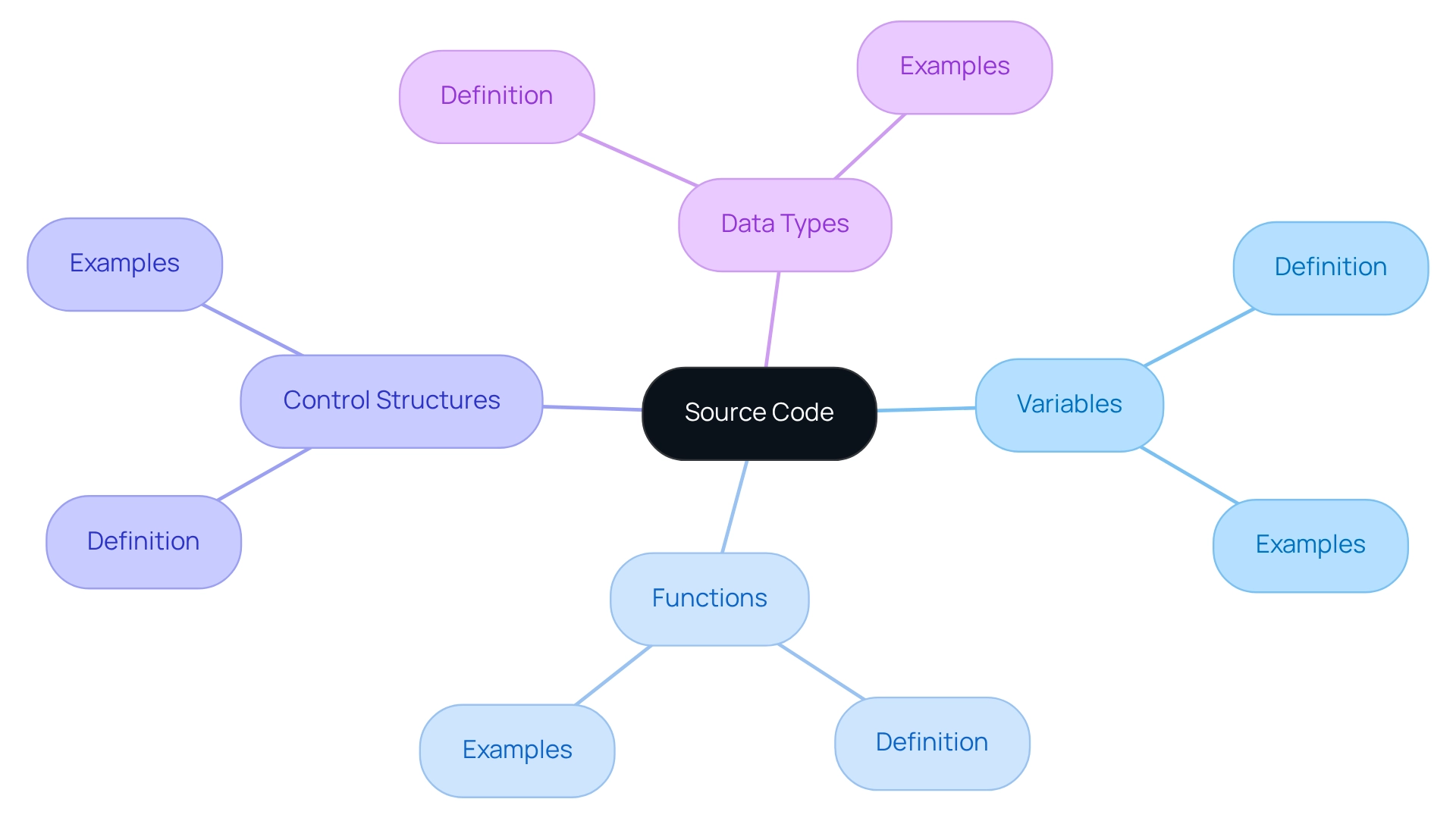
Why Source Code Matters: Key Reasons for Developers to Prioritize It
The source code application serves as the foundational blueprint for software applications, enabling developers to implement features and resolve bugs effectively. Have you ever faced challenges in coding that hinder your progress? High-quality programming in a source code application significantly enhances maintainability, promotes collaboration among teams, and simplifies updates over time.
Kodezi addresses these challenges by providing tools that enhance code quality and streamline the development process. Based on a systematic literature review, the quality of programming directly correlates with software maintainability, with studies suggesting that well-structured programs can lead to enhanced performance and security. This not only reduces vulnerabilities but also optimizes resource usage, ultimately enhancing application efficiency.
By emphasizing the quality of the programming in the source code application, creators can guarantee their applications are not only functional but also strong and safe, leading to long-term success in software creation. Furthermore, using Kodezi can improve productivity and ensure your code is robust. Explore the tools available on the platform to transform your coding experience.
Types of Source Code: Open Source vs. Proprietary and Other Classifications
Understanding programming classifications is crucial for developers facing various coding challenges. Original programming can be categorized into essential types, with open source and proprietary software being the most notable. Open source software is publicly available, allowing anyone to view, modify, and share it. This accessibility fosters collaboration and innovation within the programming community. In contrast, proprietary code is owned by specific individuals or organizations, which restricts public access and modification. Furthermore, there are other classifications such as free software, which prioritizes user freedom, and commercial software, which is sold for profit.
Navigating these classifications aids developers in addressing licensing issues and selecting the right tools for their projects. However, it's significant to note that as of 2025, one-third of companies remain hesitant to embrace open alternatives due to security concerns. This statistic emphasizes the persistent necessity for strong security measures in open development. By understanding these classifications, developers can make informed decisions that enhance productivity and code quality.
How Source Code Gets Executed: The Process Behind Code Functionality
The execution of programming instructions presents various challenges for developers, particularly in managing efficiency and performance. Composing scripts in a high-level programming language is just the first step in a multi-step process. This script is subsequently converted into machine language, which the computer can execute. Compilers play a crucial role by translating the complete source code application into machine language before execution, ensuring optimal program performance. In contrast, interpreters translate instructions line-by-line during runtime, allowing for immediate execution but potentially impacting performance.
Understanding this execution flow is vital for programmers. It enables them to enhance performance, identify bottlenecks, and resolve issues effectively. Recent advancements in compilers and interpreters have significantly improved execution times and resource management. For instance, profiling tools now collect data on execution duration and memory utilization, providing programmers with valuable insights into their software's performance. As RadhaKrishna Prasad notes, "Frequently testing the functionality we developed using a profiler and looking for common bottlenecks and issues will allow us to find and fix many small issues that may otherwise become more serious issues later on in production."
Furthermore, tools like Kodezi CLI address these challenges by enabling teams to auto-heal codebases quickly. By leveraging Kodezi AI, programmers can access robust optimization features, including commands for:
- debugging (Ctrl+D)
- optimizing (Ctrl+O)
- translating (Ctrl+T)
- generating documentation (Ctrl+G)
- producing scripts (Shift+Ctrl+G)
These capabilities illustrate the practical advantages of mastering the intricacies involved in source code application execution. Ultimately, this knowledge empowers programmers to enhance their coding practices and improve application efficiency. Why not explore the tools available on the Kodezi platform and see how they can streamline your workflow and boost productivity?
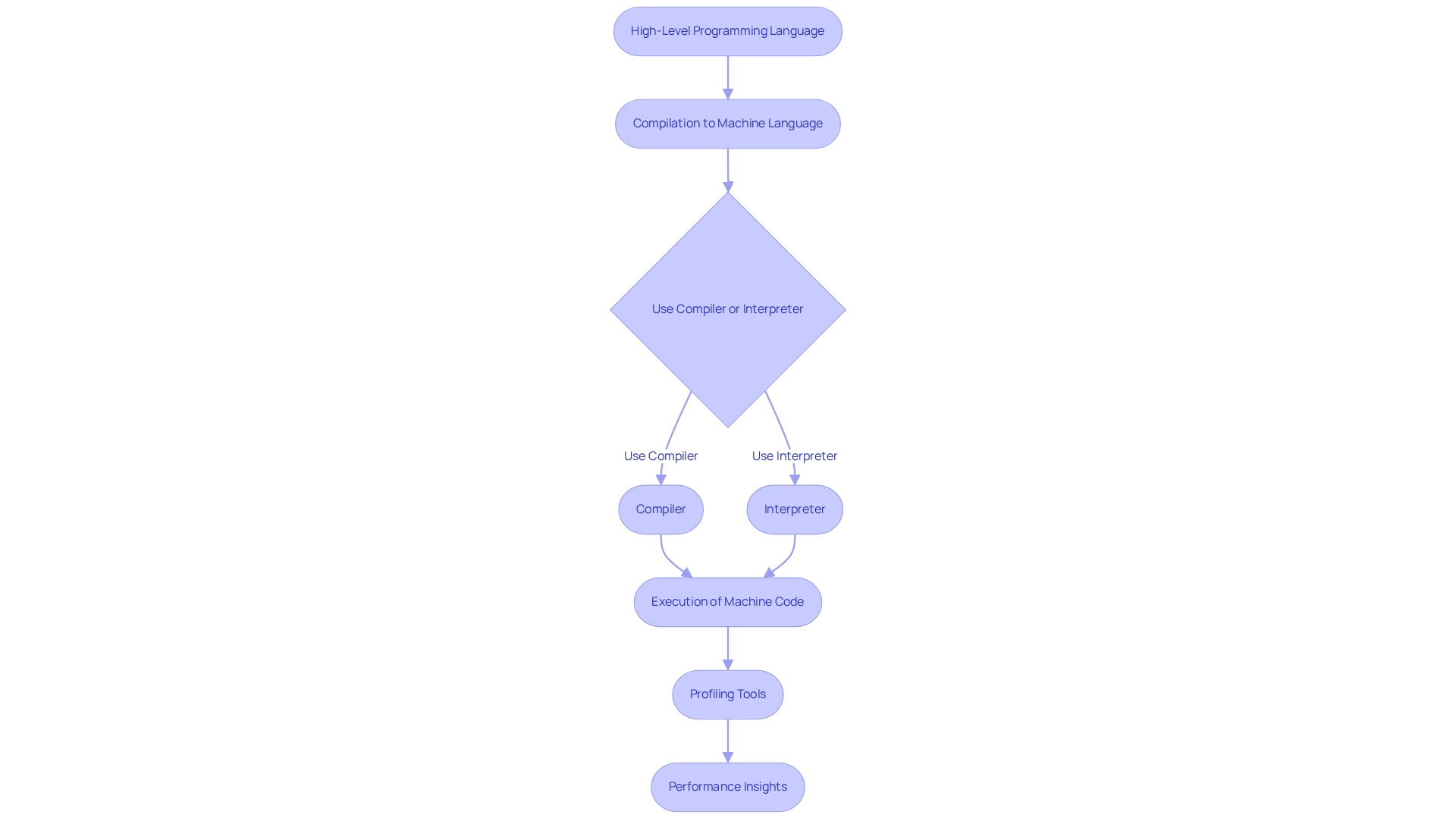
Essential Source Code Tools: Enhance Your Development Workflow
Efficient management of the source code application is essential for developers facing numerous coding challenges. A set of crucial tools significantly enhances productivity, with version control systems, particularly Git, at the forefront. These systems not only track changes but also facilitate collaboration among team members, simplifying workflows and reducing risks associated with programming changes.
Moreover, Integrated Development Environments (IDEs) like Visual Studio Code and IntelliJ IDEA contribute to productivity by offering features such as syntax highlighting, debugging functions, and smart completion. These functionalities empower programmers to create and debug software more effectively. Furthermore, analysis tools like SonarQube are vital in ensuring software quality. By identifying potential issues and ensuring adherence to best practices, these tools help developers produce cleaner and more reliable outputs.
The integration of these technologies is evident in the increasing adoption of version control systems. For instance, Atlassian’s Bitbucket has captured 7.2% of the market share in this domain. As the global version control systems market expands, driven by the demand for automation and digitalization, programmers are increasingly leveraging source code applications to enhance their workflows. Looking ahead to 2025, the landscape of source code management continues to evolve, with distinct preferences emerging for specific programming languages and cloud services. JavaScript remains the most widely used programming language, closely followed by HTML/CSS and Python. In the realm of cloud platforms, AWS and Microsoft Azure lead the industry, with 48.6% of developers favoring AWS. This trend underscores the importance of staying informed about industry advancements and utilizing the right tools to optimize processes. Are you equipped with the tools necessary to enhance your coding practices?
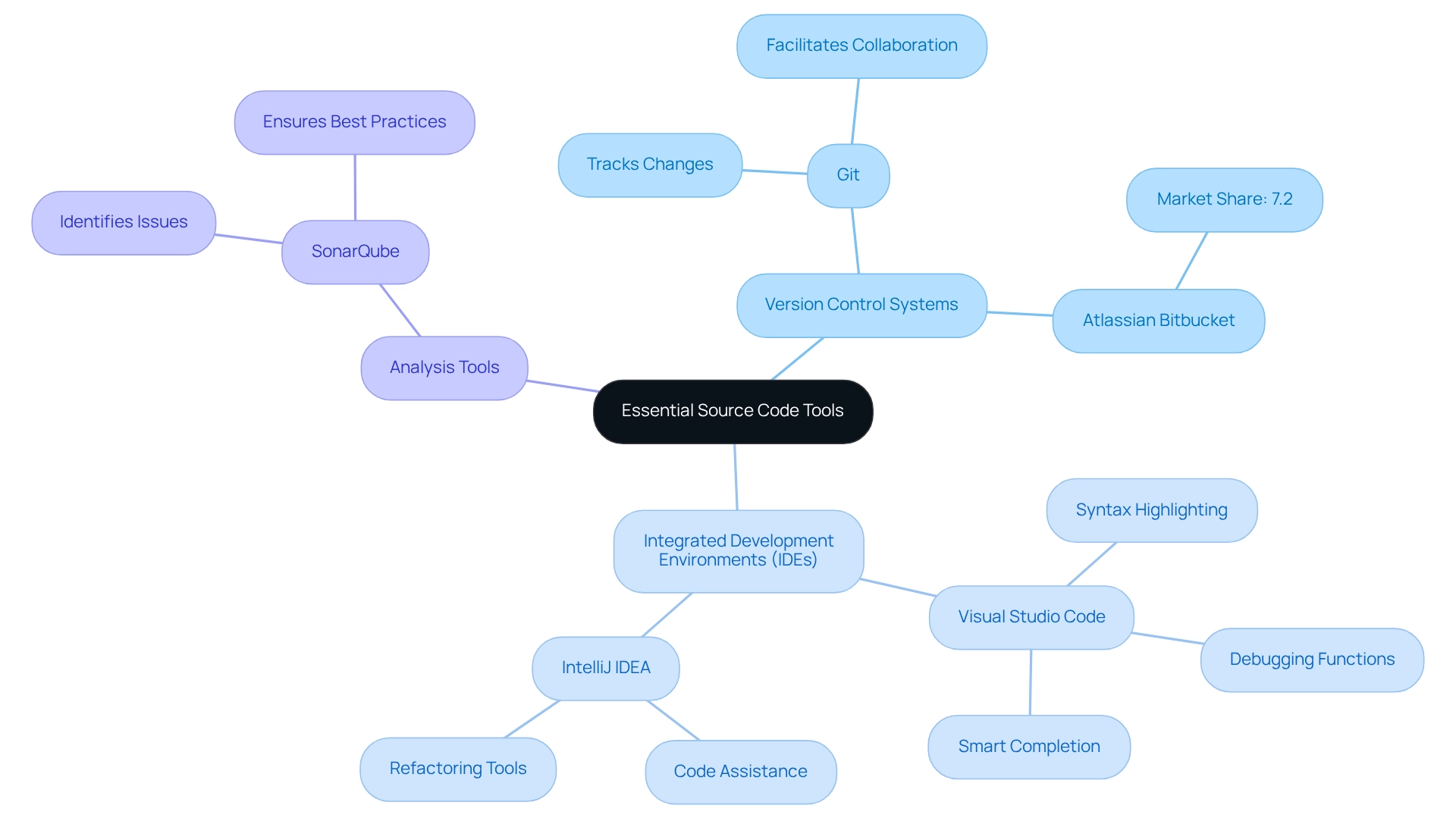
The Importance of Source Code Reviews: Ensuring Quality and Best Practices
In the realm of software development, coding challenges are an ever-present concern for developers. Source program evaluations serve as a crucial practice to combat these challenges, enabling teams to identify bugs and enhance quality before deployment. During these evaluations, programmers meticulously examine one another's scripts, ensuring adherence to coding standards, detecting potential vulnerabilities, and assessing overall functionality. This collaborative approach not only improves programming quality but also fosters knowledge sharing among team members. Junior developers benefit significantly, learning from their more experienced colleagues. Consistently conducting these evaluations cultivates a culture of ongoing enhancement and responsibility within development teams.
Furthermore, data reveals that the strictness applied during reviews correlates with a reduction in defect susceptibility, underscoring their importance in maintaining high-quality software. A recent examination of over 11,000 evaluations from the Qt open project highlighted that organized review processes substantially boost programming quality. Organizations prioritizing review practices have reported a remarkable increase in quality metrics, rising from 30% in 2020 to 50% in 2021.
In addition, successful review processes, as demonstrated in recent studies, show that effective collaboration and structured methods lead to significant improvements in software quality. These findings emphasize the vital role of program reviews in nurturing a collaborative environment where knowledge is exchanged and best practices are upheld. Ultimately, this enhances the overall success of software development teams.
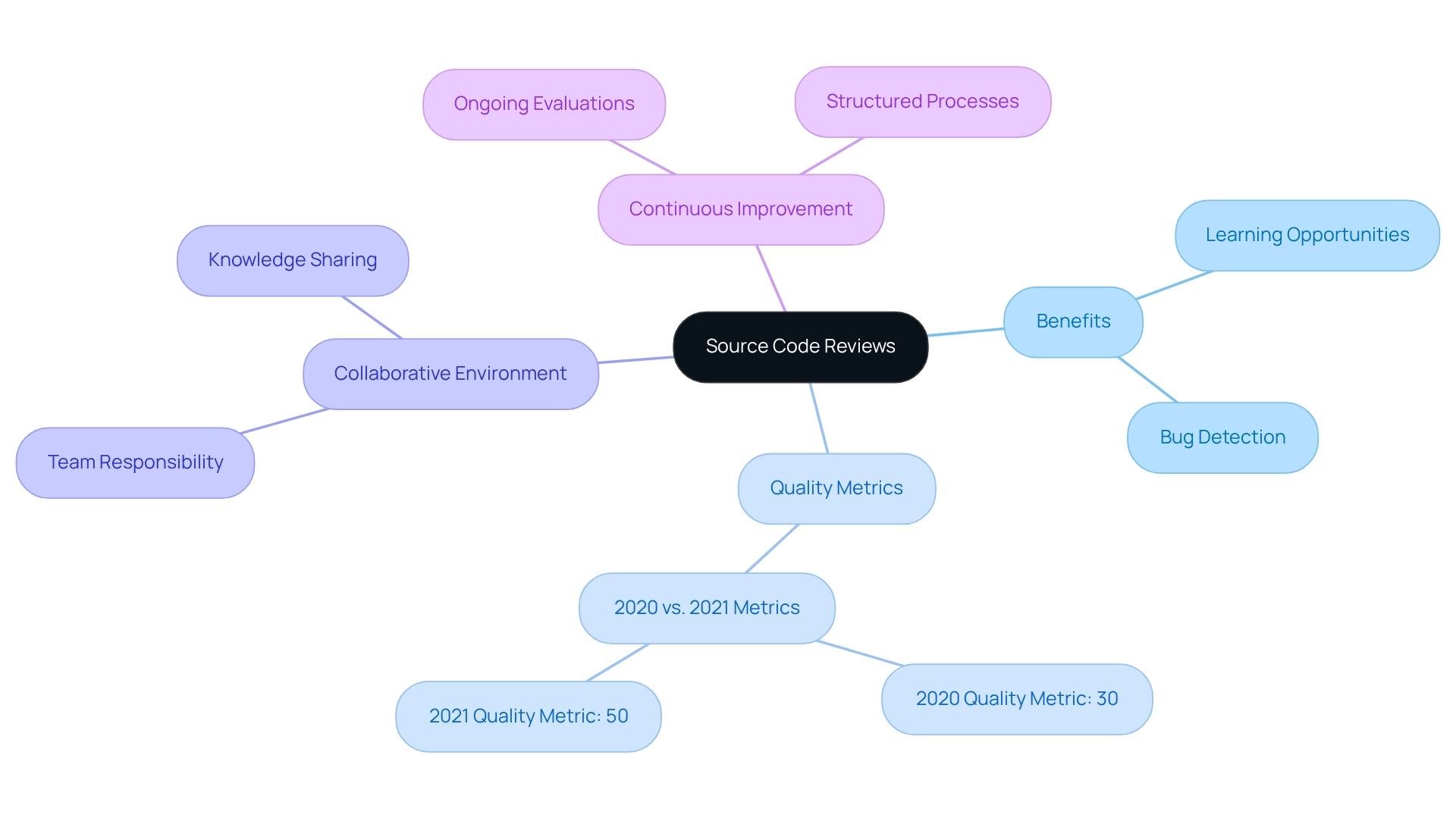
Source Code Testing: Techniques and Best Practices for Developers
Testing the source code application is crucial for ensuring that applications function correctly and meet user requirements. Developers often grapple with challenges in this area. Key techniques, such as unit testing—which evaluates individual components—and integration testing—which examines the interaction between different parts of the application—are essential. Automated testing tools, like Kodezi CLI, significantly enhance this process by autonomously improving software quality and fixing bugs before they reach production. This capability allows creators to run tests frequently, enabling them to pinpoint problems early in the development cycle.
To achieve efficient software testing, it's optimal to create clear and concise test cases, maintain a uniform testing environment, and regularly review and update tests to align with changes in the codebase. In fact, 30% of programmers favor test automation over manual testing, indicating a shift toward more efficient practices. Are you among them?
Furthermore, recent case studies reveal that 39% of teams utilizing AI-driven test automation, such as Kodezi CLI, have reported substantial efficiency gains. These include improved test maintenance and enhanced defect prediction. Kodezi CLI’s unique features, including its autonomous bug-fixing capabilities and seamless integration into existing workflows, further enhance its effectiveness as a source code application in testing. As the software testing landscape evolves with trends like AI integration and IoT testing, programmers must adjust their methodologies to stay ahead.
Samantha Spiro, Content Manager and Chief Editor, emphasizes that "grasping the importance of software creation in today's digital era is the first step toward harnessing its potential for innovation and progress." By prioritizing these testing methodologies and leveraging tools like Kodezi CLI, developers can significantly boost the reliability and performance of their applications. Ultimately, this leads to better user satisfaction and reduced maintenance costs. Are you ready to explore the tools available on the platform?
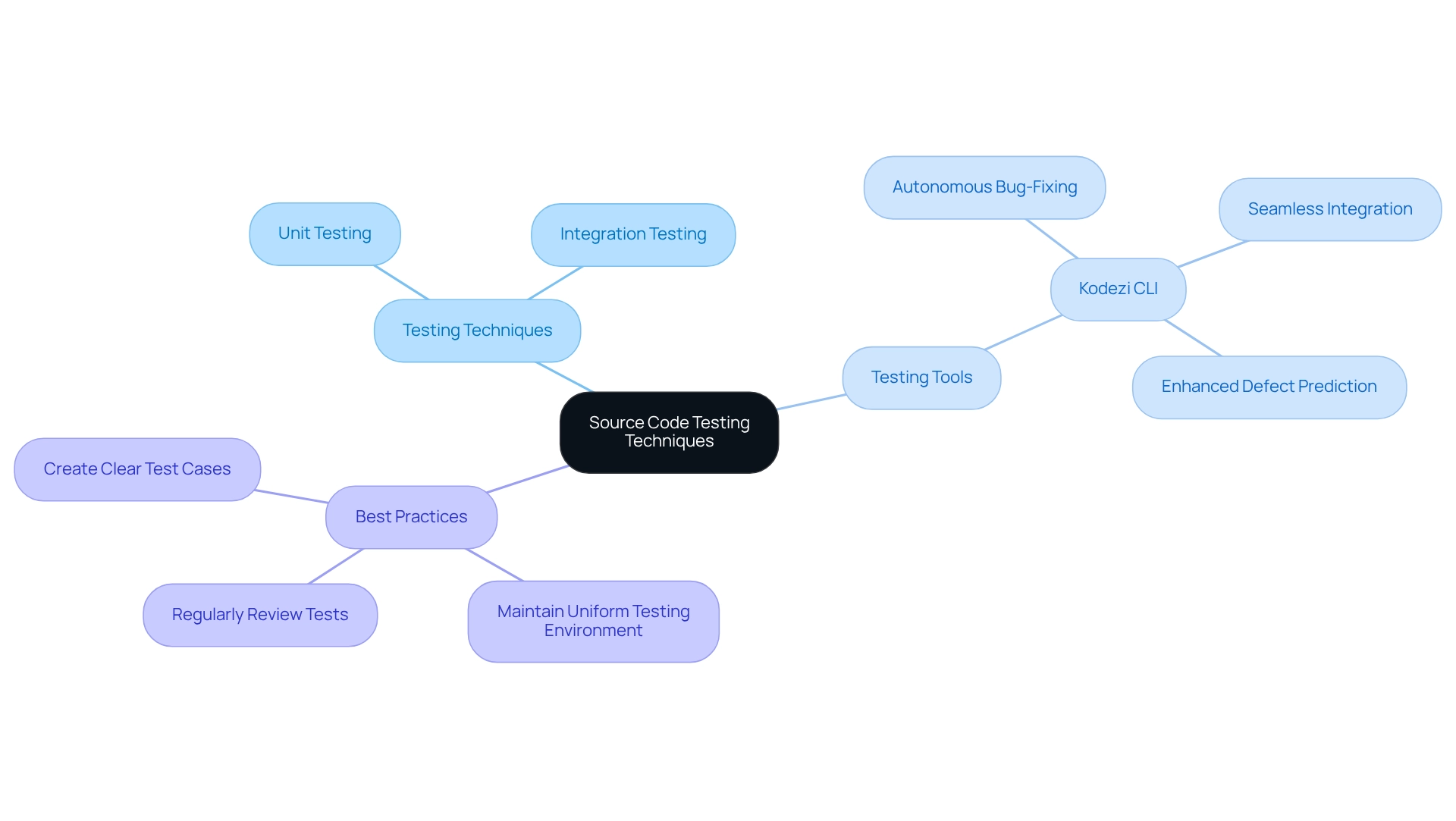
Alternatives to Writing Source Code: Exploring Different Development Approaches
In the rapidly evolving landscape of software development, traditional coding practices are increasingly challenged. Developers often face obstacles in creating efficient applications, particularly when extensive coding expertise is required. However, innovative solutions like Kodezi CLI are emerging to address these challenges. By utilizing visual programming and features designed to streamline the coding process, Kodezi empowers developers to enhance their productivity without becoming bogged down in complex coding tasks.
Furthermore, Kodezi CLI offers unique functionalities such as the AutoHeal feature, which enables enterprise developers to manage codebases effectively. This allows for quick resolution of issues, eliminating the delays associated with traditional pull requests. As a result, teams can focus on higher-level problem-solving and foster a collaborative atmosphere where both technical and non-technical stakeholders can contribute to the creation process.
The benefits of using Kodezi CLI extend beyond mere efficiency. By providing accessible tools that facilitate participation in development tasks, organizations can enhance the skills of their IT staff, aligning with the growing recognition of the need for versatile training abilities in the workforce. As low-code and no-code platforms gain traction, Kodezi CLI is poised to become an essential source code application for developers who are looking to build sophisticated applications that drive digital transformation.
As noted by Hrishikesh Joshi, an Enterprise Architect, "The future belongs to those ready to adapt and harness these advancements to address the challenges of tomorrow." This statement underscores the importance of embracing tools like Kodezi CLI in the modern software creation landscape.
In summary, exploring Kodezi CLI equips developers with the tools necessary for efficient and effective project execution, particularly when swift progress is crucial. As the industry continues to evolve, adopting innovative solutions will be vital for maintaining competitiveness and meeting the demands of contemporary software development. Explore Kodezi CLI today and discover how it can transform your development process.
Frequently Asked Questions About Source Code: Clarifying Common Misconceptions
Developers often grapple with fundamental questions surrounding program text: What is its definition? How does it differ from object form? What are the implications of choosing open versus proprietary software? A prevalent misconception is that open software is inherently less secure, while proprietary programs are viewed as superior in quality. In truth, the quality of the underlying programming hinges on the practices and standards upheld by the development team, irrespective of the software's openness. As Dr. Ian Levy, Technical Director with the CESG, pointed out, "If you look at all the bugs in closed products, the people that find the bugs don't have the code, they have IDA Pro, it's out there and it's going to work on open and closed binaries — get over it." This underscores that security relies not solely on transparency but on the development practices involved.
To illustrate, consider the difference between original instructions and executable output: original instructions are the human-readable directives crafted in programming languages, while executable output refers to the machine-readable results generated post-compilation. Understanding this distinction is vital for programmers, as it significantly impacts debugging and optimization processes.
Statistics reveal that a significant number of programmers lack awareness of essential factors affecting program quality, leading to potential misunderstandings. In 2025, experts emphasize the importance of grasping these nuances, noting that misconceptions can hinder effective communication with code. Specific statistics indicate that many programmers are unaware of the ramifications of their choices regarding open and proprietary software, which can ultimately shape their coding practices and security protocols.
Additionally, insights from software development educators stress the necessity of clarity in these concepts. A case study titled "Open Source vs Proprietary Software: Myths, Risks, and What Organizations Need to Know" delves into the differences between these software types, focusing on data control and security implications. By addressing these prevalent questions and misconceptions, developers can demystify source code, leading to informed decisions and enhanced coding practices.
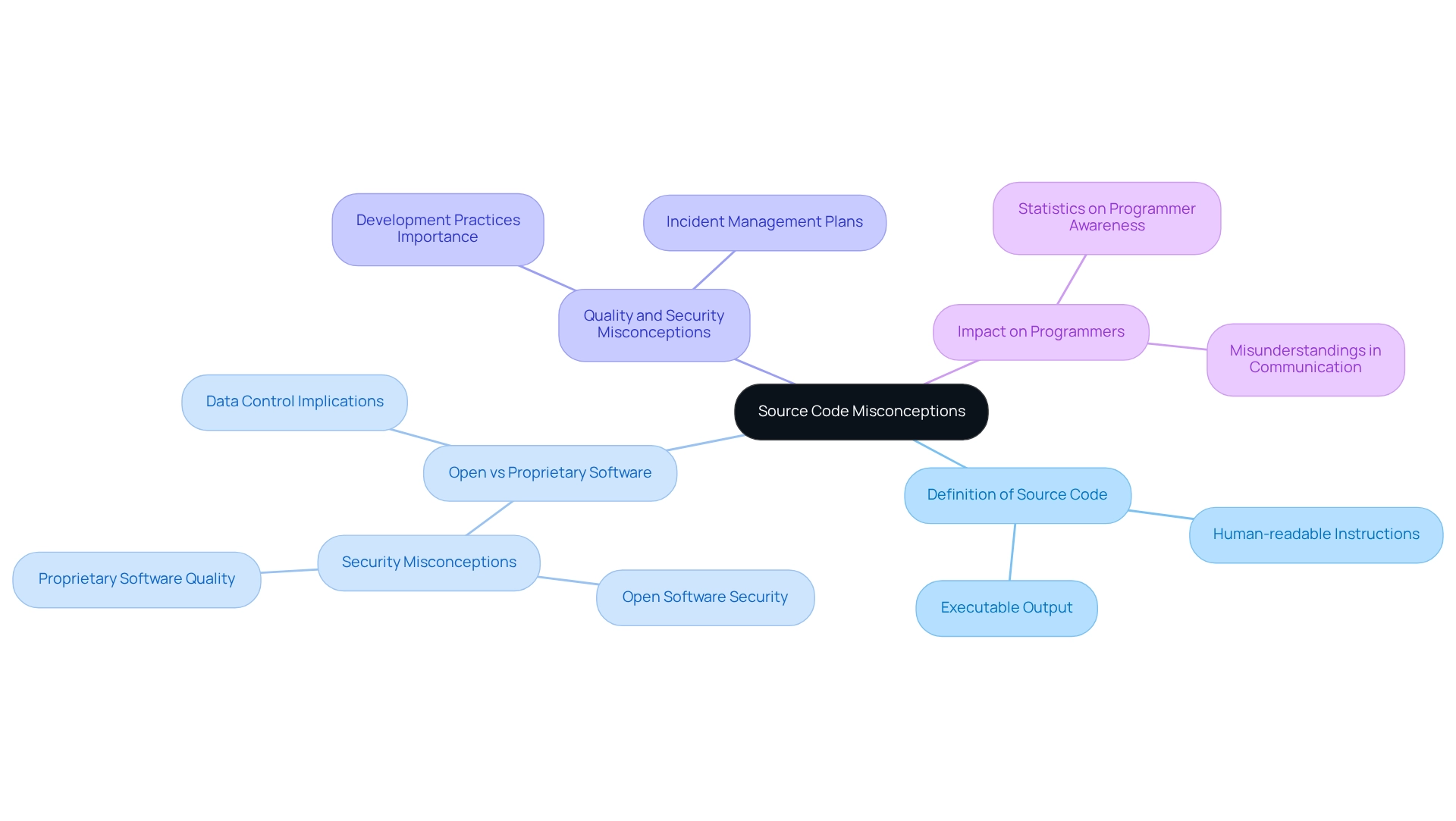
Conclusion
In the ever-evolving landscape of software development, the challenges of mastering source code are significant. Kodezi stands out as a transformative tool that simplifies source code management while enhancing collaboration and productivity among developers. By automating essential tasks such as API documentation and code optimization, Kodezi enables developers to concentrate on what truly matters—creating robust and efficient applications.
Understanding source code is crucial for producing high-quality software. Developers equipped with fundamental programming knowledge and effective testing and review processes can confidently navigate the complexities of modern development. The emergence of low-code and no-code platforms further underscores the need for adaptability, allowing a wider range of individuals to participate in development activities without requiring extensive coding expertise.
Embracing tools like Kodezi, paired with a solid grasp of source code principles, empowers developers to excel in a rapidly changing environment. As the industry progresses, prioritizing source code quality and leveraging innovative solutions will be vital for achieving successful outcomes in software projects. By taking proactive steps today—such as exploring the capabilities of Kodezi—developers can confidently and creatively tackle the challenges of tomorrow.
Frequently Asked Questions
What challenges do developers face when managing source code applications?
Developers often struggle with maintaining clear and accurate documentation, which can be complex and time-consuming.
How does Kodezi help address these challenges?
Kodezi offers a Professional OpenAPI Specification Generator that automates the generation of API specifications, allowing developers to focus on coding rather than documentation.
What benefits does Kodezi provide to developers?
Kodezi ensures APIs are well-documented and compliant with industry standards, reduces time spent on manual documentation, enhances productivity, and fosters better collaboration among team members.
Why is effective API management important in software development?
As the demand for efficient API management increases, tools like Kodezi become essential for navigating the complexities of modern software development.
What is the significance of understanding programming languages like Java and Python?
A strong grasp of these languages is crucial as they are widely used, and understanding their principles helps developers deliver efficient and scalable solutions.
What role do trends like AI, blockchain, and cloud computing play in programming?
These trends highlight the necessity for programmers to comprehend source fundamentals to remain competitive and innovative in their projects.
How can Kodezi improve coding efficiency?
Kodezi can automatically rectify scripts, analyze bugs, and optimize programming across various languages and IDEs, enhancing productivity.
What is the relationship between programming quality and software maintainability?
High-quality programming directly correlates with better software maintainability, leading to enhanced performance, security, and reduced vulnerabilities.
How can Kodezi transform the coding experience for developers?
By providing tools that enhance code quality and streamline the development process, Kodezi can improve productivity and ensure robust code.




